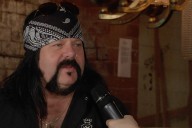Dillinger Escape Plan Interview with Ben Weinman 2017: The End, The Beginning, Mike Patton & More
By christina · On November 6, 2017Dillinger Escape Plan founding member and guitarist Ben Weinman reflects on the band’s history as they complete their farewell world tour after 20 years pushing the boundaries of innovation in modern heavy music in a new episode of “The Void with Christina” YouTube channel and podcast. A few moments from the fifty minute conversation below.
Christina: Its cool to be the architect of your own destiny … you haven’t done anything accidentally, ever.
Ben Weinman: We’ve always tried to do things that just felt right. So this is one of them.
Christina: You obviously have been now with [drummer] Billy Rymer and [bassist] Liam Wilson and [singer] Greg Puciato for a while. How has Greg changed you as a songwriter?
Ben Weinman: I don’t know if he’s changed me as a songwriter but he’s made my songs way better. It’s a weird process because the music is typically finished completely before he is involved at all. So I tend to just … the work we do in previous albums probably definitely influences things going forward when I’m writing albums and stuff like that. I probably am subconsciously thinking about our chemistry when we’re writing for sure. I’ve certainly see him just grow and grow and grow throughout his career and the albums.
Christina: He’s become this really multi-faceted singer. I was listening to the latest album today and measuring it back up against the first album he was on and I’m like wow, there has been a journey to having all these colours to paint with from once upon being just this firebrand.
Ben Weinman: It’s interesting because our personalities come off in our music. As songwriters together, my role has always been to be that stable constant that was like bringing the Dillinger sound, and I don’t want to say the Dillinger “ethic” but at least the intention of why I started the band, and maintain it.
I’ve also been a guy who has pretty much been the same guy for twenty years. People who know me they’re like “that’s Ben. He’s Ben. The same Ben.” And Greg’s been someone who is always changing and evolving and going through things and you hear that. I think his whole journey is really represented on those albums vocally and I’ve bene that base that keeps it within the … keeps it Dillinger.
Christina: Why did you start the band?
Ben Weinman: I think the purpose of this band was just to create something that didn’t necessarily exist for us. And it wasn’t to try and appeal to a certain market or to a certain kind of music fan. It wasn’t to get a record deal, or to tour the world or to be famous, or make all this money or anything like that. It really was to just to create that CD that we didn’t feel existed for ourselves. We had given up really on making it. And that is a very powerful thing.
Christina: It’s a freeing thing I think.
Ben Weinman: I was already a grown up when I started this band, technically. I was already pretty much through college and stuff like that. I’d been in a lot of local bands and things like that before Dillinger started so I can say that definitely when me and the guys who were in the band at the time made this band we just really wanted to make something that really stimulated us. Like crazy … and at the time there wasn’t really a place for it. So we obviously weren’t trying to appeal to someone, I mean people hated it.
Christina: So “Under The Running Board” was your first release right?
Ben Weinman: We put out a self-titled release that was essentially our demos, and then we did a three song EP called “Under The Running Board,” and that was really what most people first heard from us.
Christina: What was the experience of making that EP like?
Ben Weinman: That was cool because our first self-titled, which I guess as I said, was basically just demos, the guys were just getting to know each other and figure out … we had played in other bands together but [we were] figuring out what this band would be. but it wasn’t that origianl. It was still that we were trying to figure out what it was that we wanted to do.
I remember that I was just so competitive at the time. I was so over the cliques and the scenes and you know? It was 1997, ’98 … Even in the underground scene it was supposed to be somewhere you could go to be accepted, from like the jocks and cheerleaders. But it was just as bad.
So I remember that EP, those three songs, were really just a big middle finger. I remember it was me and my drummer Chris [Pennie] would get super worked up and I’d be like telling him, “Play faster,” and he’d be “I can’t! [wheezing]” and I’d say “Yes you can!”
Because I was more of the punk guy, and he was more the technical guy, and he kind of made me more technical and I made him more punk, so like … pushing me to be more technical and be better at guitar, and I’d be pushing him to play on more cymbals, and hit harder, get rid of that little splash, we don’t need that! What is this?! A little bell?! We don’t need that! I want all china cymbals! And I want you to use a cow bell as a drumstick (laughs). I remember just making him do all these crazy blasts on a china cymbal, and he was like, this is not a crash! It’s not meant for this, it’s not built for this. And I’d be like “I don’t care!” and that album was just the product of that.
Christina: Have you spoken to Chris recently?
Ben Weinman: I have seen him and spoken to him throughout the years but he’s the only one who … he kind of just disappeared. We think about it because these last shows are coming up, like would he come out? But, you know. He’s kind of in a different place in his life. He went and joined other bands. I don’t even think he plays drums anymore which is such a shame, because he’s such a talent.
It was tough. We were creatively really important to each other, but we were really different people. His work ethic to play drums was insane. All he wanted to do was sit in his basement and practice. And I was the guy who was like, there’s no point if you’re not out there. I was the guy getting a job at an office so I could use the copy machine to make flyers. Going to basement shows, and going to the city to see crazy shit. I was just the hustler, you know? I was into the whole thing, not just the playing.
We all came from the New York, New Jersey, D.C. area where there was a lot going on, the CRo-Mags and the Bad Brains … living in the suburbs and going into the city where all this crazy stuff was going on, all the itme and being able to sneak into the city and see all this crazy dangerous unpredictable subculture of music had a huge effect on me. The metal world was what it was but it was the hardcore and punk world that really shaped the whole work ethic and the attitude that you should be here to play and to kick ass and have a cathartic outlet for all your emotions.
I wanted to go out and bring it back to the practice space. He didn’t get why we didn’t play all the time in a basement. But I think that kind of dynamic helped grow what Dillinger was, but I think it ultimately clashed and he ultimately went and quit and joined that Coheed band. It was hurtful but what I learned from that was really valuable, that everybody’s replaceable. If their heart’s not in it, everyone’s replaceable.
Christina: And they can bring a whole new thing to it.
Ben Weinman: And this band is more than a couple of people. It’s an entity in itself.
Christina: What did Billy Rymer teach you about rhythm?
Ben Weinman: (Laughs). It’s made me realise white boys do have rhythm. Billy has just changed my attitude in general. He’s been super inspiring. He loves drums. He’s so humble. He learns from everyone. Even people that he’s clearly way better than, he doesn’t think that way. He’s just so humble and so into being better and getting better but he never sacrifices living life.
Christina: How would you contextualise it? You can’t. That’s what I see with my friends who have been lifelong fans of the band … that it sounded like nothing they’d ever heard before. [They’d be like] What does this even mean?! What I think that’s really cool about it is the balance of it. It’s got this real catharsis in it, but you’re also really talented at balancing space. It’s like this onslaught of vocals but then it pulls back a bit, and there’s almost like this violence on this shifting sands sonic base.
Ben Weinman: That’s really life, right? And this band has been very lucky to be able to be so adventurous. We took a lot of risks early on in this band which gave us a huge freedom.
Christina: What was the biggest risk you took?
Ben Weinman: I think at a time when we started to get some popularity, and there were some expectations of what we should sound like and who we should be, that was the biggest challenge – making sure that we silenced that, you know what I mean? We were not cool kids. We were not part of a scene. We were not the ones with all the friends. We didn’t have people coming to our shows like … we were not part of a clique. So it would have been real easy once we started getting traction and there was a lot of hype around us in the local scene we came from, we got signed to a cool label … it would have been really easy for us to try and change gears. When I say change gears I don’t mean like musically, I mean with our intentions.
One of the things that I know on our second album “Miss Machine” that I did intentionally was include a song I’d written just for fun, that I didn’t think was for Dillinger. I didn’t consider it a Dillinger song. It was a song called “Unretrofied.” It was something that I had just written from front to back, lyrically, the melody, everything … I thought it would just be something for fun, or a side project or something like that. I remember thinking to myself: Why am I putting my music into a box? That’s what I’m trying to get other people not to do. Why I am I saying this isn’t Dillinger? I write Dillinger, I wrote this. It’s Dillinger. Including things like that on intentionally on our sophomore release which would have really defined what we would be moving forward, I think was definitely making a statement that we wouldn’t be confined into a specific space.
Listen to our previous podcast interview conducted in January 2016 below (or by subscribing on iTunes):
Weinman discusses how Mike Patton was the reason singer Greg Puciato joined the band, how current bandmates Greg and Billy have changed him, the meanings behind some of their most played songs, what’s next, what original singer Dimitri thinks of their sold out finale show and more. Watch on YouTube here. Listen to The Void with Christina podcast on iTunes.
Check out more The Void with Christina interviews below.







No Comments